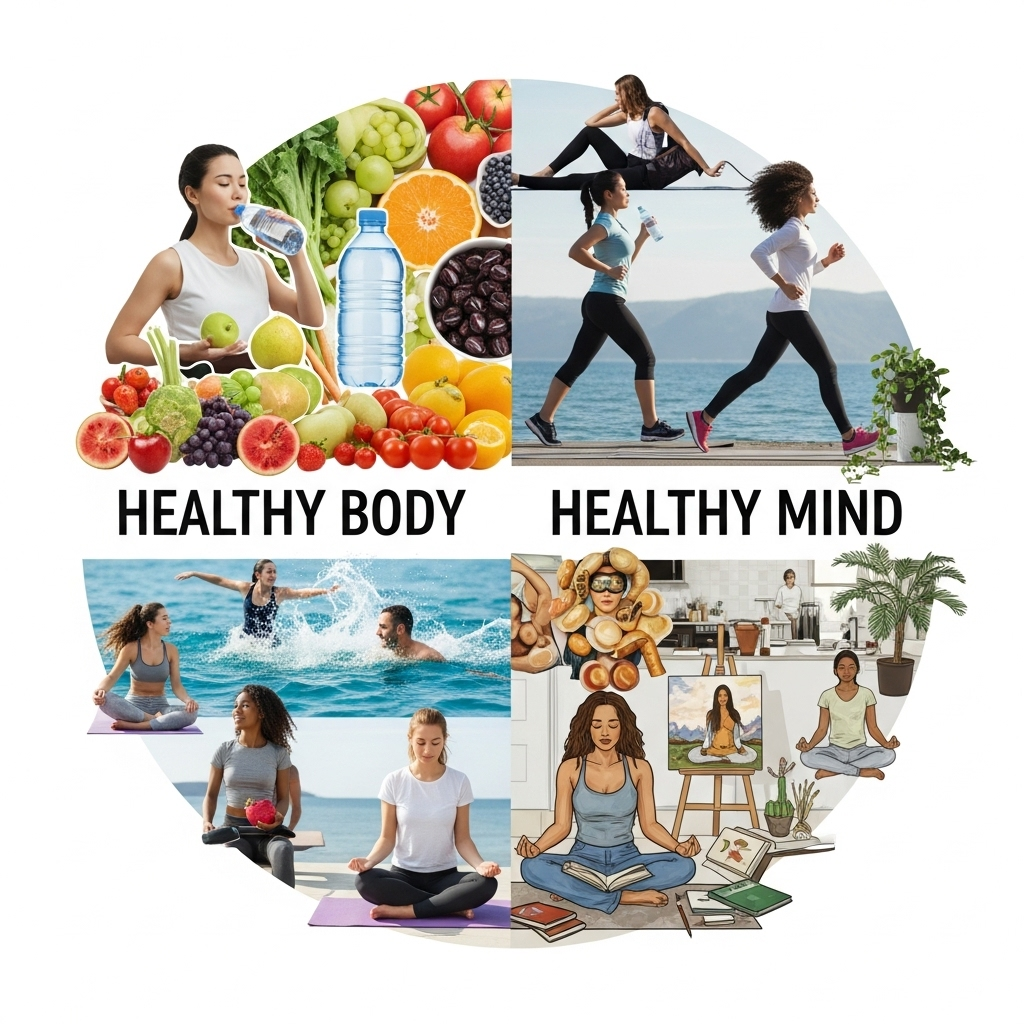What we eat doesn’t just affect our waistline — it shapes our brain, mood, energy, and resilience. Over the past decade a growing body of research from universities and medical centers around the world has made clear that nutrition is an under-used, safe, and powerful tool for supporting mental health. This article explains the science in plain English, lists the key nutrients and foods tied to better mental wellbeing, gives practical meal and lifestyle advice you can use today, and answers the questions people search for online about food and mood.
Tone: empathetic and practical — food isn’t a magic cure for depression or anxiety, but for many people improving diet can reduce symptoms, sharpen thinking, and increase emotional stability. If you’re struggling with mental illness, this article complements medical care, not replaces it. Always consult a clinician for diagnosis and treatment.
Quick snapshot — what you’ll learn
- How nutrition affects the brain (gut-brain axis, inflammation, neurotransmitters).
- The most important nutrients for mood and cognition.
- Food patterns linked to lower depression and anxiety (and the strongest university-backed evidence).
- Practical, evidence-based tips and a sample day of meals to support mental health.
- FAQs that answer common search queries like “What foods boost mood?” and “Can diet help anxiety?”
Why food and mood are connected: the science explained simply
Your brain is an organ with high metabolic needs — it uses about 20% of your body’s energy — and it depends on a steady supply of nutrients to make neurotransmitters, maintain cell membranes, and regulate inflammation and stress responses. Several biological pathways explain how diet influences mental health:
- Neurotransmitter production
Many brain chemicals that influence mood — serotonin, dopamine, GABA — are made from dietary building blocks (amino acids, vitamins, minerals). For example, serotonin is synthesized from the amino acid tryptophan; tyrosine is a precursor for dopamine. If your diet is chronically low in the right amino acids and cofactors (vitamin B6, folate, magnesium), neurotransmitter synthesis can be impaired. - Inflammation and oxidative stress
Chronic low-grade inflammation and oxidative damage are linked to depression and cognitive decline. Diets high in processed foods, refined sugars, and industrial seed oils can raise inflammation. Conversely, diets rich in antioxidants (berries, leafy greens), omega-3 fats, and polyphenols lower inflammation and support brain health. - Gut–brain axis
The gut microbiome communicates with the brain through neural (vagus nerve), immune, and metabolic signals. Beneficial gut bacteria produce short-chain fatty acids and neurotransmitter precursors that can positively influence mood. Diet strongly shapes the microbiome — fiber, fermented foods, and diverse plant foods support a healthy gut ecosystem. - Blood sugar stability
Rapid swings in blood glucose (from high-sugar foods and refined carbs) are associated with mood instability, irritability, and fatigue. Balanced meals that include fiber, protein, and healthy fats promote steady blood sugar and steadier mood. - Brain structure & neuroplasticity
Nutrients like omega-3 fatty acids, B vitamins, vitamin D, and antioxidants support neuronal membrane health and neuroplasticity (the brain’s ability to form and reorganize neural connections), which is crucial for resilience and recovery from stress.
Many of these mechanisms have been explored in university research programs. Notably, the SMILES trial from Deakin University (Australia) — a randomized controlled trial — found that a structured dietary intervention (based on Mediterranean principles) improved depressive symptoms compared with social support alone. Harvard, Oxford, UCLA, and other institutions have published observational and interventional research linking diet quality to lower rates of depression, anxiety, and cognitive decline.
Which foods and nutrients matter most for mental health?
Below are the nutrients researchers repeatedly identify as important for mood, cognition, and resilience — plus practical food sources.
1. Omega-3 fatty acids (EPA & DHA)
- Why: Structural components of brain cell membranes; anti-inflammatory; associated with lower depression and improved cognition.
- Sources: Fatty fish (salmon, mackerel, sardines), algae-based supplements (vegan), walnuts (contain ALA which converts poorly to DHA/EPA).
- Research note: Multiple meta-analyses suggest omega-3 supplementation (especially EPA-dominant formulas) can help reduce depressive symptoms, particularly as an adjunct to standard care.
2. B vitamins (B6, B12, folate)
- Why: Cofactors in neurotransmitter synthesis and methylation pathways; deficiencies linked to fatigue, low mood, and cognitive problems.
- Sources: Leafy greens (folate), beans, lentils, fortified cereals, eggs, dairy, lean meats, and shellfish (B12). Vegetarians/vegans may need B12 supplementation.
3. Vitamin D
- Why: Neurosteroid with roles in immune regulation and mood; low vitamin D status is commonly observed in people with depression.
- Sources: Sunlight (skin synthesis), fatty fish, fortified dairy/plant milks, supplements when needed.
4. Magnesium
- Why: Involved in neurotransmission, stress response, and sleep regulation; low magnesium has been associated with anxiety and poor sleep.
- Sources: Nuts, seeds, legumes, whole grains, leafy greens (spinach), and dark chocolate.
5. Zinc
- Why: Important for neural signaling and immune function; low zinc status has been observed in some people with depression.
- Sources: Oysters, red meat, poultry, beans, nuts, and seeds.
6. Antioxidants and polyphenols
- Why: Reduce oxidative stress and inflammation; support vascular and neuronal health.
- Sources: Berries, tea (green/black), cocoa (dark chocolate), colorful vegetables, coffee (moderate), extra virgin olive oil.
7. Fiber and prebiotic foods
- Why: Feed beneficial gut bacteria that produce short-chain fatty acids and other metabolites that influence brain function.
- Sources: Whole grains, legumes, vegetables, fruits, onions, garlic, leeks, asparagus, bananas.
8. Protein (complete amino acids)
- Why: Provide tryptophan and tyrosine needed for serotonin and dopamine synthesis; protein also stabilizes blood sugar.
- Sources: Eggs, dairy, lean meats, fish, soy, legumes, quinoa.
Food patterns that research links to better mental health
Rather than single “superfoods,” diet-wide patterns show the strongest and most consistent links to mental wellbeing.
Mediterranean-style diet
Characterized by high intakes of vegetables, fruits, whole grains, legumes, nuts, fish, olive oil, moderate dairy, and low red/processed meat. Observational and interventional research (including Deakin University’s SMILES trial and various cohort studies at institutions like Harvard and Oxford) links Mediterranean-type diets with lower risk of depression and better cognitive outcomes.
DASH (Dietary Approaches to Stop Hypertension)
Originally designed to lower blood pressure, the DASH pattern (vegetable-heavy, low sodium, whole-grain focused) has also been associated with improved mood and cognitive health in some studies.
Whole-food, plant-forward diets
Diets emphasizing unprocessed plant foods (with adequate protein and healthy fats) tend to improve gut health, lower inflammation, and correlate with better mental health markers in population studies.
Important caveat: Most robust evidence supports dietary patterns over any single food or supplement. Improving overall diet quality yields greater benefits than focusing narrowly on one nutrient.
Practical, evidence-based tips: what to eat and how to eat it
These are actionable steps that align with research while being realistic for everyday life.
12 practical tips to support your mental health through nutrition
- Adopt a Mediterranean pattern: lots of vegetables, fruits, legumes, whole grains, olive oil, and regular fish.
- Choose fatty fish twice a week (or consider an algae EPA/DHA supplement if you don’t eat fish).
- Eat a variety of colorful plant foods daily — aim for 4–6 different fruits/vegetables per day.
- Prioritize whole grains and fiber: oats, brown rice, quinoa, barley. Aim for at least 25–35 g of fiber daily.
- Include a good protein source at each meal to stabilize blood sugar and support neurotransmitter production.
- Snack on nuts and seeds (unsalted almonds, walnuts, pumpkin seeds). A small handful is a nutrient-dense choice.
- Limit ultra-processed foods and sugary drinks — these are linked to worse mood and inflammation in many studies.
- Add fermented foods (yogurt, kefir, tempeh, sauerkraut, kimchi) for gut health, but don’t rely on them alone to “fix” complex issues.
- Watch alcohol: excessive intake worsens depression and anxiety for many people; moderate or avoid depending on how it affects you.
- Stay hydrated: even mild dehydration can affect concentration and mood.
- Get vitamin D checked if you live in low-sunlight regions or have risk factors; supplement if deficient.
- Plan for regular meals and snacks to prevent blood sugar dips that trigger irritability and low energy.
Sample day: simple heart-and-brain friendly meals
| Time | Meal | Why it helps |
|---|---|---|
| Breakfast | Oat porridge with mashed banana, walnuts, chia seeds, and berries | Fiber, omega-3 ALA, polyphenols, stable energy |
| Mid-morning snack | Greek yogurt with a sprinkle of ground flaxseed | Protein, probiotics, omega-3 precursor |
| Lunch | Salad with mixed greens, cherry tomatoes, chickpeas, quinoa, avocado, olive oil & lemon; grilled salmon | Balanced protein + omega-3s + fiber + healthy fats |
| Afternoon snack | Apple slices with almond butter | Fiber, healthy fat, keeps blood sugar steady |
| Dinner | Stir-fry with tofu or chicken, broccoli, bell peppers, brown rice, ginger, garlic | Protein, veggies, prebiotics, polyphenols |
| Evening (optional) | A small square of 70% dark chocolate or a cup of green tea | Antioxidants, mood-lifting flavonoids |
This plan focuses on whole foods, regular protein, healthy fats, and fiber — all supportive of mood and cognition.
Who may benefit most — and when to seek clinical care
Dietary improvements can help many people — including those with mild to moderate depressive symptoms, people dealing with stress, and anyone who wants to support cognitive health. However:
- If you are experiencing major depressive disorder, severe anxiety, suicidal thoughts, psychosis, or sudden changes in mood/function, seek immediate medical help. Nutrition is a complementary strategy; it’s not a substitute for psychiatric treatment when needed.
- If you have medical conditions (e.g., bipolar disorder, eating disorders, severe nutrient deficiencies), coordinate dietary changes with your medical and mental-health providers to avoid harm.
- Pregnant or breastfeeding people, adolescents, and older adults may have special nutrient needs — consult clinicians for tailored plans.
Common pitfalls and myths
- Myth: One “superfood” will cure depression. Reality: No single food is a cure. Whole-diet approaches show the best evidence.
- Myth: Supplements are always better than food. Reality: Supplements can help when deficiencies exist, but whole foods offer complex nutrient packages and fiber that supplements can’t fully replace.
- Pitfall: Sudden extreme dieting. Cutting calories severely or eliminating food groups without guidance can worsen mood and trigger disordered eating. Aim for sustainable, gradual changes.
Table: Quick nutrient → food → mental health roles
| Nutrient | Food sources | Role for mental health |
|---|---|---|
| Omega-3 (EPA/DHA) | Salmon, sardines, mackerel, algae oil | Anti-inflammatory, membrane fluidity, associated with reduced depression |
| B vitamins (B6, B12, folate) | Leafy greens, beans, eggs, liver, fortified cereals | Neurotransmitter synthesis, energy metabolism |
| Vitamin D | Sunlight, fatty fish, fortified milk | Immune modulation, mood regulation (low levels linked to depression) |
| Magnesium | Spinach, nuts, seeds, legumes | Sleep, stress response, GABA function |
| Zinc | Oysters, beef, beans, pumpkin seeds | Neural signaling, immune function |
| Fiber / Prebiotics | Whole grains, legumes, onions, garlic, asparagus | Feed gut bacteria; support SCFA production and gut-brain signaling |
| Polyphenols / Antioxidants | Berries, tea, cocoa, olives | Reduce oxidative stress and inflammation |
University research highlights (select, high-quality examples)
- Deakin University (SMILES trial, 2017) — A randomized controlled trial where participants with major depression randomized to a Mediterranean-style dietary intervention showed greater improvements in depressive symptoms than a social support control group. This trial is one of the strongest pieces of evidence for dietary interventions in clinical depression.
- Harvard T.H. Chan School of Public Health — Large cohort studies from Harvard investigators have repeatedly found that higher diet quality (more fruits, vegetables, whole grains, fish) is associated with lower incidence of depression over time.
- University of Oxford / PREDIMED follow-ups — While PREDIMED focused on cardiovascular outcomes, secondary analyses and related cohort work at Oxford and elsewhere have linked Mediterranean patterns with lower rates of depression and cognitive decline in older adults.
- University of California, Los Angeles (UCLA) — Research on the gut microbiome from UCLA and other U.S. institutions highlights mechanisms by which bacterial metabolites influence brain circuits relevant to anxiety and mood. (Microbiome research is rapidly evolving; many findings are promising but still emerging.)
These university studies support the biological plausibility and real-world relevance of nutrition for mental health — but note that science evolves, and individual results vary.
7 signs your diet may be affecting your mental health
- Frequent energy crashes and irritability after meals (blood sugar swings).
- Low motivation and brain fog despite adequate sleep.
- Worsening of mood when you eat a lot of ultra-processed foods or sugary drinks.
- Sleep problems that correlate with late heavy meals or caffeine overuse.
- Frequent gastrointestinal problems (bloating, irregularity) coinciding with mood changes.
- Poor recovery from stress and longer periods of low mood following unhealthy eating episodes.
- Nutrient-deficiency signs (pale skin, hair changes, mouth sores) that accompany mood symptoms.
If several signs apply, a gentle dietary reset under professional guidance may help.
FAQs — quick answers people search for
Q: Can food really change my mood?
A: Yes — for many people, diet quality influences energy, stress resilience, sleep, and mood. Research shows associations and some causal evidence from dietary intervention trials, but effects vary and food is one of multiple factors that affect mental health.
Q: What are the best foods to improve mood?
A: Foods that appear most helpful include fatty fish (omega-3s), leafy greens (folate), berries (antioxidants), nuts & seeds (magnesium, healthy fats), legumes (fiber and B vitamins), whole grains, and fermented foods (for gut health).
Q: Are supplements necessary?
A: Supplements can help correct deficiencies (e.g., vitamin D, B12, omega-3s), but whole foods are preferable. Discuss supplements with your healthcare provider before starting them.
Q: How fast will diet changes affect my mental health?
A: Some people notice small changes in energy and sleep within days to weeks; measurable improvements in mood or depression often take several weeks to months and are more likely when diet changes are sustained and paired with other treatments if needed.
Q: Can diet prevent depression or anxiety?
A: A healthy dietary pattern reduces risk but doesn’t guarantee prevention. Genetics, life events, sleep, exercise, social support, and medical conditions also play major roles.
Q: Is the gut microbiome the key to mood?
A: The gut microbiome is an important piece of the puzzle. Eating fiber, prebiotics, and fermented foods supports beneficial bacteria, which can produce metabolites that communicate with the brain. However, microbiome science is complex and still emerging.
Q: I have an eating disorder — should I change my diet for mood?
A: If you have or are recovering from an eating disorder, dietary changes should be supervised by an eating-disorder specialist. Focus on recovery first; sudden restrictive diets may be harmful.
Q: Where do I start if my diet is poor and my mood is low?
A: Start small: add one extra serving of vegetables daily, swap refined grains for whole grains, choose a fatty fish twice weekly, and cut back on sugary drinks. Consider working with a registered dietitian, especially one experienced in mental-health nutrition.




